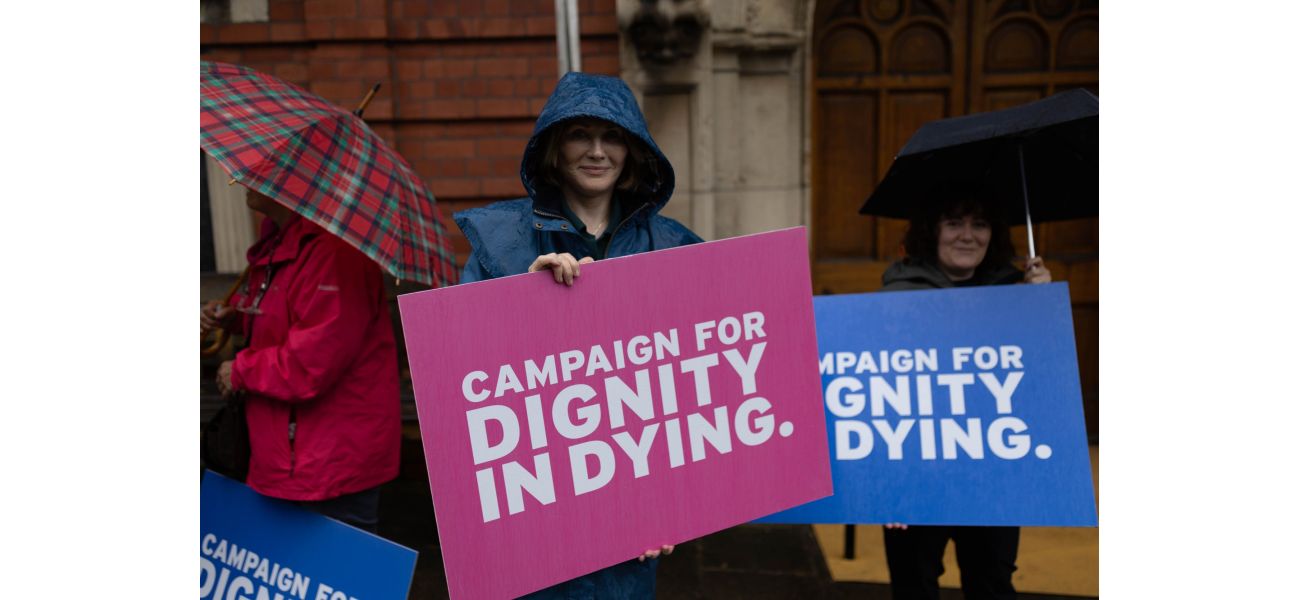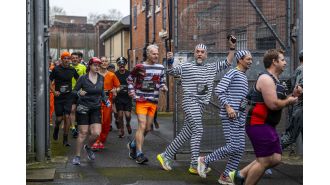A jury of citizens believes assisted dying should be allowed in England.
The majority of individuals desire assisted dying to be lawful in England.
September 12th 2024.

A group of passionate campaigners gathered outside Parliament in April to voice their support for assisted dying. These individuals, from all walks of life, believe that assisted dying should be allowed in England. To further support their cause, a citizen's jury panel was formed, consisting of randomly selected citizens. This panel spent eight weeks deliberating the topic of assisted dying, with the help of written materials, videos, and presentations provided by the Nuffield Council on Bioethics.
After careful consideration, the panel came to a majority decision that the law should be changed to permit assisted dying in England. Their reasoning was guided by the belief that assisted dying could alleviate pain and provide individuals with dignity in their final moments. However, the panel stressed that this option should only be available to those who are terminally ill and have the capacity to make the decision to end their life.
The issue of assisted dying hits close to home for many members of the panel, as some of them have had personal experiences with end-of-life care. For instance, one jury member named Ashok shared his own encounter with a terminally ill patient who was forced to suffer for months because she refused treatment. This heartbreaking experience influenced Ashok's decision to support assisted dying.
The citizen's council was formed after an Assisted Dying Bill was introduced in the House of Lords in July. As the panel continued their discussions, some members expressed concerns about the potential misuse and misinterpretation of assisted dying. On the other hand, those who voted in favor of it believed that it should be an option for individuals to have control over their own death and to die with dignity.
As the conversation around assisted dying grows, different perspectives and opinions have emerged. Dame Esther Rantzen, who has stage four lung cancer, has joined the fight for the "right to die" by becoming a member of the campaign group Dignitas. However, opponents of assisted dying argue that it could be abused and could potentially lead to less funding for palliative care.
Despite the differing viewpoints, the panel's decision to support assisted dying has caught the attention of policymakers, who are considering whether and how to take forward legislative change. The chairwoman of the Nuffield Council on Bioethics' assisted dying advisory board, Professor Anne Kerr, believes that the jury's findings indicate broad support for a change in the law in England.
It's important to note that the debate around assisted dying and assisted suicide is a controversial one. While a limited number of countries have allowed voluntary assisted suicide, it remains illegal in England, Wales, and Northern Ireland. In Scotland, it is not a specific criminal offence, but it could potentially result in murder charges or other offences.
One recent example of the use of assisted suicide is the case of two pensioners from Suffolk who have announced their decision to end their lives together in a suicide pod created by Australian euthanasia advocate Philip Nitschke. This further highlights the ongoing discussions and debates surrounding assisted dying.
For those who may feel overwhelmed or in need of support, there are resources available. The Samaritans, a 24-hour helpline, offers emotional support to individuals in need. Additionally, PAPYRUS, a charity focused on preventing young suicide, has a 24/7 helpline and other resources for young people and those concerned about them. Ultimately, the decision to end one's life should not be taken lightly, and it's important for individuals to have access to support and resources during such difficult times.
After careful consideration, the panel came to a majority decision that the law should be changed to permit assisted dying in England. Their reasoning was guided by the belief that assisted dying could alleviate pain and provide individuals with dignity in their final moments. However, the panel stressed that this option should only be available to those who are terminally ill and have the capacity to make the decision to end their life.
The issue of assisted dying hits close to home for many members of the panel, as some of them have had personal experiences with end-of-life care. For instance, one jury member named Ashok shared his own encounter with a terminally ill patient who was forced to suffer for months because she refused treatment. This heartbreaking experience influenced Ashok's decision to support assisted dying.
The citizen's council was formed after an Assisted Dying Bill was introduced in the House of Lords in July. As the panel continued their discussions, some members expressed concerns about the potential misuse and misinterpretation of assisted dying. On the other hand, those who voted in favor of it believed that it should be an option for individuals to have control over their own death and to die with dignity.
As the conversation around assisted dying grows, different perspectives and opinions have emerged. Dame Esther Rantzen, who has stage four lung cancer, has joined the fight for the "right to die" by becoming a member of the campaign group Dignitas. However, opponents of assisted dying argue that it could be abused and could potentially lead to less funding for palliative care.
Despite the differing viewpoints, the panel's decision to support assisted dying has caught the attention of policymakers, who are considering whether and how to take forward legislative change. The chairwoman of the Nuffield Council on Bioethics' assisted dying advisory board, Professor Anne Kerr, believes that the jury's findings indicate broad support for a change in the law in England.
It's important to note that the debate around assisted dying and assisted suicide is a controversial one. While a limited number of countries have allowed voluntary assisted suicide, it remains illegal in England, Wales, and Northern Ireland. In Scotland, it is not a specific criminal offence, but it could potentially result in murder charges or other offences.
One recent example of the use of assisted suicide is the case of two pensioners from Suffolk who have announced their decision to end their lives together in a suicide pod created by Australian euthanasia advocate Philip Nitschke. This further highlights the ongoing discussions and debates surrounding assisted dying.
For those who may feel overwhelmed or in need of support, there are resources available. The Samaritans, a 24-hour helpline, offers emotional support to individuals in need. Additionally, PAPYRUS, a charity focused on preventing young suicide, has a 24/7 helpline and other resources for young people and those concerned about them. Ultimately, the decision to end one's life should not be taken lightly, and it's important for individuals to have access to support and resources during such difficult times.
[This article has been trending online recently and has been generated with AI. Your feed is customized.]
[Generative AI is experimental.]
0
0
Submit Comment





